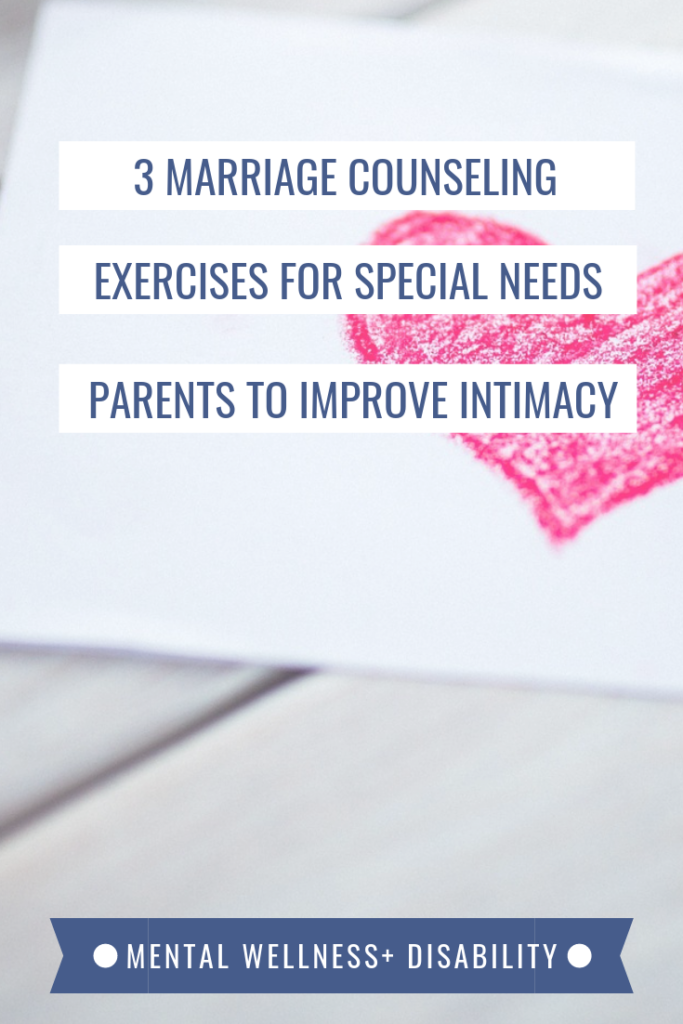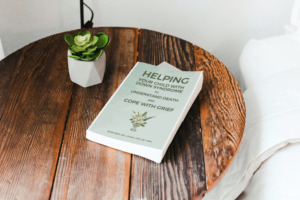Parents of kids with disabilities face some truly unique challenges, both as individuals and as partners.
When I see special needs parents for couples counseling to address their struggles, they often say similar things. They are overwhelmed by the emotional, physical, and mental toll that meeting their child’s needs has taken. They feel disconnected in their marriage. But they aren’t sure where to even begin to try to rebuild what’s been lost.
For couples who feel this way, have hope.
Research has shown that simply committing time to working on your marriage is one of the strongest predictors of future marital satisfaction.
Here are three exercises that you can do together at home to foster intimacy as a couple. The idea is that these exercises and the follow up questions I’ve listed after each one will give you a place to start your dialogue. By talking about what you’re doing well to express your love for each other, and the areas you’d like to do better in, you’ll be better able to understand the types of intimacy that you and your spouse are grateful for, and what you’re craving more of.

The Intimacy List
If you’re trying to increase intimacy, it’s important to first know what intimacy is! It’s way more than physical and sexual intimacy. Of course, those are important, but there are many other ways that a couple can share intimacy.
If you look for other resources on this topic, you’ll usually see lists of 5 or 8 types of intimacy. The list I’ve included here is excerpted from Fife, S.T., & Weeks, G.R. (2010). Barriers to recovering intimacy. In J. Carlson & L. Sperry (Eds.) Recovering intimacy in love relationships: A clinician’s guide (pp. 157-179). New York: Routledge.
I like this list because it’s quite comprehensive and includes a lot of ‘higher level’ types of intimacy, like aesthetic and spiritual intimacy. Many of the couples I see for marriage counseling who have kids with disabilities feel that they couldn’t possibly make time for these kinds of intimacy. I like to use this list as a reminder that those types of intimacy are real and attainable, and that if they are important to you, you and your spouse can find ways to grow in those areas.
I also find that this list’s more ‘operational’ forms of intimacy, like financial and work intimacy, reflect the real issues that most couples face. For example, many lists don’t include financial intimacy, but a marriage where spouses don’t agree on financial goals and visions is one that is most likely unsatisfying.
Types of intimacy (other than sexual and physical)
Aesthetic Intimacy – Sharing experiences of beauty – music, nature, art, theater, etc.
Communication Intimacy – Connect through talking. Keep communication channels open. Listen to and value your spouse’s ideas. Be loving, compassionate, respectful, giving, truthful, and open in your communication.
Conflict Intimacy – Facing and struggling with differences together. Using resolution of conflict to grow closer together.
Creative Intimacy – Experiencing closeness through acts of creating together. Sharing expressions of love in creative ways.
Crisis Intimacy – Developing closeness in dealing with problems and pain. Standing together in tragedies. Responding together in a united way to pressures of life such as working through problems, raising a family, illness, aging, etc.
Emotional Intimacy – Feeling connected at an emotional level. Being in tune with each other’s emotions; being able to share significant meanings and feelings with each other, including negative feelings.
Financial Intimacy – Working together to balance differing attitudes about money. Developing a unified plan for budgeting, spending, and saving. Having shared financial goals.
Forgiveness Intimacy – Apologizing to each other. Asking for forgiveness. Asking your spouse, “What can I do to be a better husband/wife?”
Friendship Intimacy – Feeling a close connection and regard for one another as friends.
Humor Intimacy – Sharing through laughing together. Having jokes between the two of you that only you share. Making each other laugh. Enjoying the funny side of life.
Intellectual Intimacy – Experiencing closeness through sharing ideas. Feeling mutual respect for each other’s intellectual capacities and viewpoints. Sharing mind-stretching experiences. Reading discussing, studying together.
Parenting Intimacy – Sharing the responsibilities of raising children, including providing for their physical, emotional, and spiritual needs. Includes working together in teaching and disciplining them as well as loving them and worrying about their welfare.
Recreational Intimacy – Experiencing closeness and connection through fun and play. Helping each other rejuvenate through stress-relieving and enjoyable recreation together.
Service Intimacy – Sharing in acts of service together. Growing closer as a couple as you experience the joy that comes from giving to others.
Spiritual Intimacy – Discovering and sharing values, religious views, spiritual feelings, meaning in life, etc.
Work Intimacy – Experiencing closeness through sharing common tasks, such as maintaining a house and yard, raising a family, earning a living, participating in community affairs, etc.
What to do:
Each partner should review this list alone. Identify types of intimacy where you feel your marriage is strong, and then pick out the areas you’d like to improve in, either by spending more time or more quality time devoted to that type of intimacy. Then come together to talk about your selections.
Take note of:
- Are your spouse’s picks what you’d have predicted? Or were you surprised by what they felt your marriage was strong in and what they wanted to improve in?
- What do your lists have in common? How are they different?
- For the areas you want to increase intimacy in, are these areas that you feel you used to be strong in that have suffered, or are you looking to add a new type of intimacy to your relationship?
- Of the areas you’ve both highlighted for improvement, which seem the most attainable? Are there any that seem impossible?
What next:
Make a commitment to each other that you’ll give at least 20 minutes of your time each day to addressing those areas that you want to improve in. 20 minutes is only 1.3% of your 24 hour day, you can spare it! And if you’re struggling to ‘make time’, try using an Eisenhower box to delegate and eliminate the things that you don’t personally need to be doing with your time.
It’s OK to start small, and it’s OK if it feels a little awkward or silly at first. For instance, if you’re feeling a lack of creative intimacy, maybe you’ll sneak a few pages out of one of your child’s coloring books, and just sit together and color. Over time, it will begin to feel more natural, and you’ll be ready for more of a challenge. For most couples, they feel most intimate when they become comfortable taking risks together.
The Appreciation List
What to do:
For one week each of you should write down one thing your partner did for you that you appreciated each day. It doesn’t have to be a grand gesture, and it can absolutely be something they do every day.
Personally, I swoon whenever my husband walks our dog when it’s cold out, since I enjoy life most when it’s lived above 60 degrees. It’s a little thing that he doesn’t mind doing, but it means the world to me.
Over time in a marriage, it’s easy to feel taken for granted. Some days, you may feel like the only things you’re attending to in your household are your child’s needs, let alone your own, and certainly not your spouse’s. This exercise can help you both see the little things that you do for each other, and that you have done for you.
After the week is up, sit down to compare your experiences.
Take note of:
- What types of intimacy do the things you do for each other reflect? For instance, your spouse might demonstrate communication intimacy by stopping writing an email for work when you ask them to talk.
- If you had to pick the things you appreciated most that your spouse did for you this week, do they represent areas of intimacy that you feel are strong in your marriage, or that are lacking? For example, if you’ve been craving aesthetic intimacy, and your spouse leaves roses on your bedside table just because they thought you’d appreciate waking up to something beautiful, does that resonate more strongly with you than if they show intimacy in a way that they usually do?
- Were there things your spouse appreciated that you did for them that were surprising to you?
What next:
Commit to continuing to make small gestures to show each other love and gratitude.
Plan ahead for another week long appreciation list exercise at some point in the future; maybe 6 weeks from now, or 6 months from now, it doesn’t matter as long as you both agree to it. Don’t let one Appreciation List exercise end without planning when you’ll do the next one!
The Memory List
What to do:
Each of you recalls and writes down five times that you felt truly connected and intimate.
The memories don’t have to be major events. I have a vivid memory of the look of sheer joy on my husband’s face the first time our infant son sneezed (to be clear, it was a completely adorable sneeze). In that terribly brief moment, I had a powerful sense of how deeply my husband loved our new little baby, and how delighted he was to be a father. In the haze of sleepless nights and endless feedings, it was the first time I truly felt parenting intimacy….and clearly it left an impression, because my son is now almost five and still sometimes asks me to tell him the story of how Daddy looked when he first sneezed!
Come together to talk about these times. Make it your goal to truly understand what about this experience resonated with your spouse, and what type or types of intimacy were at play. It could be the case that you both choose the same event, but that you have different reasons that you felt connected at that time. Rather than reflecting on how you felt during this time, focus on listening to what about it was special to your spouse.
Take note of:
- Are there times you both included on your lists? If so, were the types of intimacy that you experienced the same, or were they different?
- Were there times you were surprised that your spouse included?
- Do you see any trends in terms of type of intimacy? Is there one type of intimacy that’s in many of your favorite times? Looking at your first list exercise, these days do you perceive your marriage to be strong in this type of intimacy, or is it an area you’d like to focus on improving?
What next?
Each of you imagine that five years have passed. If you were to do this exercise again, what memories might you have of the past five years that would be deeply intimate for you? Spend time truly visualizing and imagining what those moments might be, and then write down all of the details you can about them. Try to come up with at least five.
Come together with your spouse, and each of you talk about the moments of intimacy you’re hoping to have. Are they likely to happen? What will help them to happen? What barriers stand in the way? Does your spouse have similar hopes, or are theirs different, and how?
Exercises like these can be a simple way to start conversations about the intimacy in your marriage. Understanding what’s working and what’s not working for each of you can help you rekindle the feelings that brought you together in the first place.
I’d love to know if there are other exercises you’ve used to open a dialogue with your spouse about your intimacy!












